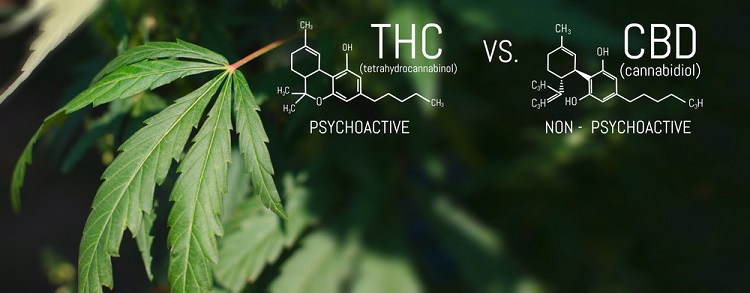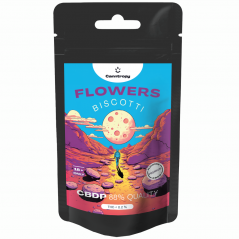CBD and its effects: how does CBD work and what can it do?
- What is CBD?
- Endocannabinoid system: Processing and production of cannabinoids in the body
- How does CBD work in the human body?
- CBD vs. THC: How both substances work
- Therapeutic potential of CBD
- CBD and its effects: what are the possible uses?
- Types of CBD products: full spectrum vs. broad spectrum vs. isolate
- Bottom line
What is CBD?
CBD stands for cannabidiol. Cannabidiol is the second most abundant substance in the cannabis plant, occurring in higher concentrations in the upper third of the plant, especially in the canes and upper leaves. The main psychoactive component of cannabis (marijuana) is tetrahydrocannabinol or THC or delta-9-THC. It is the amount of THC in cannabis that determines whether the plant is viewed as an addictive substance (marijuana) or as cannabis. In the Czech Republic , the limit is set at 1%, while in the EU the maximum permitted THC level is 0.3%. Medical cannabis prescribed by a doctor is a separate category and can have different ratios of THC and CBD.
Thus, both CBD and THC cannabinoids are found in cannabis, as are CBN, CBG and are also called phytocannabinoids. At first glance, CBD and THC are chemically very similar, as they share the same molecular formula C21H30O2, but they differ in chemical structure (the atoms are arranged differently), so each of these compounds has different effects on the body. While CBD is a non-psychoactive cannabinoid, THC is psychoactive.

Cannabidiol is extracted from cannabis using one of the extraction methods and the CO2 extraction method is considered to be particularly good because, when done correctly, the final product is pure, potent and free of chlorophyll.
Endocannabinoid system: Processing and production of cannabinoids in the body
What most of us may not realize is that the human body has its own system for processing and even creating cannabinoids. This system is known as the endocannabinoid system (ECS). Its discovery in the United States in 1988 opened the door to systematic research on cannabis in recent years and subsequently revealed new perspectives on its medical use.
The ECS is involved in many physiological processes, such as the regulation of pain, mood, cognitive function, immunity and metabolism. The main role of the ECS is to maintain homeostasis in the body, and according to a number of studies, CBD and other cannabinoids appear to help restore balance to the body when this "balance" is disturbed.
Cannabinoid receptors are found throughout our bodies. So far, two primary endocannabinoid receptors have been identified: CB1 receptors are found mainly in areas of the brain where they play an important role in memory and motor function, while CB2 receptors are primarily present in cells of the immune system and in bone marrow cells.
Because naturally produced cannabinoids play a central role in our bodies, they have been carefully studied in recent decades. The topic of whether and how the ECS can be affected by CBD has been widely debated among the scientific community. Indeed, it could potentially provide a treatment solution for many serious or previously untreatable diseases.

How does CBD work in the human body?
In layman's terms, cannabinoids are the key and cannabinoid receptors are the lock. So, by using cannabis, we are injecting keys that fit into various cellular locks in our body.
Unlike THC (tetrahydrocannabinol), which binds to both cannabinoid receptors, CB1 and CB2, cannabidiol does not bind directly to any receptors. In fact, it affects the endocannabinoid system by inhibiting the enzyme FAAH, which is responsible for the breakdown of the endocannabinoid anandamide. This leads to increased levels of anandamide in the brain.
Anandamide, also known as the "bliss molecule", is one of the most important endocannabinoids in the body. Due to its chemical structure, very similar to THC, it binds to the same receptors of the endocannabinoid system. Anandamide is considered a mood-enhancing substance and may also be involved in the function of a number of other processes such as appetite, pain and memory.
In addition, it is associated with slowing the formation of cancer cells. In a 1998 study, a group of Italian scientists found that anandamide effectively slowed the formation of breast cancer cells. Other research has also shown that increased levels of anandamide in the brain can reduce symptoms of depression and anxiety disorders.
Given the above evidence that anandamide has significant medical potential, it would seem that using CBD is an appropriate way to take advantage of these benefits. However, at this point, scientists still do not fully understand anandamide and its effects on the body in the context of cannabinoids. Therefore, more research is needed to clarify how anandamide works in our bodies, what benefits it may have, and how we can regulate it.
CBD and other receptor systems that trigger
- Serotonin system
CBD targets a specific serotonin receptor, the serotonin 1A (or 5-HT1A) receptor. One of the functions of this receptor is to control anxiety and stress. Evidence from various studies suggests that CBD - by activating 5-HT1A receptors - can alleviate autonomic responses to stress and lead to a reduction in anxiety. This raises the possibility that CBD could be useful in the treatment of psychiatric disorders such as depression, anxiety disorder and post-traumatic stress disorder.
- Vanilloid receptors
Another CBD-activated receptor is the vanilloid receptor type 1 (TRPV1). It is involved in the perception of pain and inflammation. Studies have shown a positive correlation between elevated levels of TRPV1 and diseases associated with chronic pain, such as arthritis. The inhibitory effect of CBD on TRPV1 could therefore alleviate pain.
CBD vs. THC: How both substances work
THC is psychoactive and causes a known 'high' or 'high', whereas CBD does not have these effects. Although both substances are so-called phytocannabinoids (phyto-plant origin), each has a slightly different effect on the human body. THC primarily targets the cannabinoid receptor 1 (CB1), which is mainly found in the central nervous system.
CBD does not directly bind to these receptors. The effects of CBD are directed by THC (mild high) by acting on other receptors. In short, if a person feels uncomfortable after consuming cannabis and has anxiety or depression as a result of consuming large amounts of THC, CBD should help them get back to normal.
THC typically interferes with contact with reality, perception of time and space, impairs the ability to concentrate and causes short-term memory problems.

Therapeutic potential of CBD
CBD can potentially help with a wide range of symptoms and illnesses, both mental and physical. It appears that it could be used to combat stress, burnout syndrome, sleep disorders, epilepsy, anxiety disorders, schizophrenic psychosis, inflammation and inflammatory pain, nausea and vomiting, migraine, neuropathy, addiction to THC, nicotine, alcohol, hypnotics and opiates, appetite inhibition and antioxidant cell protection.
Quick summary: Table of possible effects of CBD
Below you will find a table of potential effects, with links to the studies where CBD's therapeutic properties show the most promise.
|
Effects of CBD |
Study |
|
According to the study, CBD has the potential to reduce anxiety in people with conditions such as general anxiety disorder, post-traumatic stress disorder, panic disorder and obsessive-compulsive disorder. |
|
|
The role of cannabinoids in dermatology suggests that CBD may help to reduce skin dryness and relieve symptoms of itching. |
|
|
A study published in the Journal of Experimental Medicine found that cannabidiol significantly reduced chronic inflammation and pain in mice and rats. |
|
|
An exploratory cross-sectional study, Cannabidiol as a treatment for arthritis and joint pain, revealed an association between CBD use and improvement in patients' arthritis symptoms. CBD use may also have reduced the doses of other medications. |
|
|
In a randomised controlled trial from 2021, researchers concluded that an 8-week treatment with CBD-rich cannabis induced significant clinical improvement and improved quality of life, with levels of inflammatory markers (C-reactive protein, calprotectin) in the body and patients' endoscopic scores remaining unchanged. |
|
|
A study conducted suggested that cannabis users had a 17% decrease in insulin resistance. |
|
|
The study suggests that CBD has antiepileptic effects in epilepsy patients with a low risk of side effects. It is also thought that cannabidiol may treat other symptoms associated with epilepsy, such as neurodegeneration, neuronal injuries and psychiatric illnesses. |
|
|
A study by Leweke et al. (2012) suggests that cannabidiol has antipsychotic effects. |
|
|
The British Journal of Clinical Pharmacology has published a study suggesting that cannabidiol could have the potential to prevent the growth and spread of cancer cells and promote their demise. In addition, scientists have recognised that cannabidiol has a low level of toxicity. |
|
|
The 2023 review suggests that CBD, CBG and CBC could be promising compounds for the development of new antibiotics. |
CBD and its effects: what are the possible uses?
"Studies have shown that CBD has a positive effect on inflammation, pain, anxiety, psychosis and spasms, but it should be noted that most of these applications are not treated with CBD alone and actually require some level of THC," said Constance Finley, founder and CEO of Constance Therapeutics.
Mental health (anxiety, depression)
The World Health Organization states that depression is the most common mental illness. It affects up to 300 million people worldwide each year. In order for CBD to help with a problem as complex as depression, just consuming it is not enough. It is advisable to include other treatments such as psychotherapy, regular exercise or dietary changes.
In a 2020 review, experts focused on the anxiolytic, antidepressant and antipsychotic effects of CBD found in animal and human studies. In rodents, the results suggest that the effects of CBD depend on dose, strain, time of administration (acute vs. chronic), and route of administration. Furthermore, the review notes that preliminary clinical studies also confirm the efficacy of CBD as an anxiolytic, antipsychotic and antidepressant, including a positive benefit-risk profile.
A growing body of evidence suggests that inflammation may be involved in the pathophysiology of at least some forms of depression. For example, one study reports that inflammation is likely to be a critical factor in illness that increases susceptibility to depression.
A 2010 study reported that CBD produces antidepressant effects comparable to those of Imipramine. The results further suggest that these effects of CBD may be mediated by activation of 5-HT(1A) receptors.
Another review examined several studies that looked at the anxiolytic and antidepressant effects of CBD in animal models, various experiments such as the forced swim test, the elevated cross maze and the Vogel conflict test. CBD shows anti-anxiety and antidepressant effects in animal models.
Another study, titled Prohedonic Effect of Cannabidiol in a Rat Model of Depression, suggests that cannabidiol demonstrated a prohedonic (willingness to move toward a goal or avoid unpleasantness) effect in rats that underwent a carbohydrate preference test, an elevated cross-maze test, and exploration of novel objects.
Skin diseases
Research from 2019: The therapeutic effect of CBD-enriched ointment for inflammatory skin diseases and skin scars was focused on people suffering from psoriasis, eczema or scars. This study revealed that CBD hydrates the skin and increases its elasticity.
CBD and acne
Acne is caused by excessive production of sebum, which promotes the development of bacteria inside the pores. This leads to inflammation, swelling and redness around the pores. Cannabidiol helps fight various skin problems. In 2014, research came out suggesting that CBD has the potential to reduce excessive sebum production, making it a promising therapeutic tool for treating acne.
When CBD ointment is used, a direct dose of the active ingredient reaches the surface of the skin. Taken internally, CBD can fight the underlying causes of acne, such as inflammation or excessive sebum production.

CBD and psoriasis
Psoriasis, or psoriasis, is a skin disease caused by an autoimmune disorder that causes skin cells to regenerate too quickly. Itchy, red, scaly patches form on the body. There is no cure for this disease. However, research has shown that externally applied products containing a high proportion of CBD can reduce the severity of the disease and prevent flare-ups before they occur.
Research from 2023 entitled: Lipid-stabilized nanoparticles with cannabidiol alleviate psoriasis severity in mice: a novel approach for improved topical drug delivery suggests that the data reviewed confirms the efficacy of CBD in psoriasis therapy.
CBD and eczema
Eczema is an inflammatory disorder that affects the outer layers of the skin (epidermis). The rough, dry patches caused by eczema can be extremely itchy and painful. The benefits of CBD in combating this condition are primarily that it relieves pain and itching of the skin while inhibiting inflammation in the skin.
Some studies suggest that cannabis oil may be beneficial to soothe symptoms
dry skin and itching in atopic dermatitis. The combination of hemp oil with CBD has a synergistic effect that contributes to skin care, especially thanks to its regenerative ability, which can "resurrect" even very tired and stressed skin.
Tip: Try Hemnia Eczema Relief - Universal hemp ointment for eczema, which contains 250 mg of CBD. The ointment contains only natural ingredients and helps with all eczematous manifestations on all parts of the body.
Chronic neuropathic and inflammatory pain
Pain is our body's way of telling us that something is wrong at that moment. But for some people, it can persist for months or even years. In this case, we talk about chronic pain. Chronic pain is divided into two groups according to its origin: neuropathic and inflammatory.
CBD may help relieve chronic pain due to the way it interacts with our ECS. It activates cannabinoid receptors and restores levels of endocannabinoids that the body produces on its own. These substances determine how we experience pain. Their deficiency can manifest itself in increased pain sensitivity.
Neuropathic pain usually results from damage to nerves or pain sensors. Its treatment is very difficult. Only 40-60% of patients get partial relief with conventional drugs. The results of recent research have suggested that CBD oil may be a very effective natural alternative in the fight against nerve-related pain.
Inflammatory pain arises due to the immune system's reactions to toxins and infections.
MedicalNewsToday reported that people are effectively using CBD oil as a pain reliever to treat illnesses associated with chronic pain. For diseases such as arthritis in which there is increased sensitivity and expression of the TRPV1 receptor, cannabidiol oil may be a useful aid.
Arthritis
Rheumatoid arthritis is an autoimmune disease. Its basic cause lies in a malfunctioning immune system. The exact cause of arthritis is still unknown. As a consequence of arthritis, the cartilage of the joint and the bone underneath it are damaged, resulting in the destruction and deformation of the joint itself. The disease most commonly affects the wrists and small joints in the hands and feet.
CBD is proving to be an effective tool in the fight against various forms of rheumatism and joint damage. CBD oil can help with arthritis not only in humans but also in dogs.
In addition, cannabidiol has an immunomodulatory effect. That is, it does not force the immune system to over-activate (as immunostimulants do) or suppress it (as immunosuppressants do). A modulating effect means that it will amplify the immune system's activity when it is working too slowly, and weaken it when it is working too much.
Intestinal diseases such as Crohn's disease
Crohn's disease is defined as a chronic inflammatory bowel disease. This autoimmune disease affects the digestive tract and in severe cases can cause life-threatening complications. While CBD does not directly cure the disease, it can help with many of its symptoms. It can relieve symptoms of nausea and indigestion, stimulate appetite, and reduce pain. It contributes to a good night's sleep, which helps significantly in combating fatigue.

Diabetes (diabetes)
More than 900 000 people in the Czech Republic suffer from diabetes. Diabetes is a metabolic disease that impairs the ability of the patient to process carbohydrates in the body, from which most of our energy comes. Whenever we eat something, sugars from food enter the blood through the digestive tract. Cells then use this sugar to support their activity. But the sugar doesn't get into the cell without a special guide known as insulin, a hormone responsible for regulating blood sugar levels.
If the ingested food contained simple sugars (as in the case of candy or white bread), it is digested very quickly and insulin removes most of the sugar from the blood just as quickly. If the body experiences such sudden spikes and dips in blood sugar levels over a long period of time, it will learn to ignore insulin. Thus, it tries to maintain stable blood sugar levels. This stage is called insulin resistance. In the next stage, blood sugar levels rise, but inside the cells themselves they fall and eventually insulin stops working properly.
Diabetes is therefore a disease caused by an imbalance in the metabolic system - but CBD can help not only with its symptoms, but also with the actual cause of the disease.
One study found that cannabis users had a 17% decrease in insulin resistance, suggesting that cannabis increases the effectiveness of insulin in doing its job. When insulin works properly, the body can better control blood sugar levels. Another non-negligible benefit of CBD is the fact that it reduces appetite, thus helping to maintain a healthy weight. CBD can also help with other manifestations of diabetes - it relieves nerve pain and anxiety, for example.
Neurodegenerative diseases
Neurodegeneration leading to Parkinson's and Alzheimer's disease has become a huge health burden worldwide. Current treatment focuses primarily on symptom management and no drugs are available in clinical practice to prevent neurodegeneration or induce neuronal recovery.
CBD and Parkinson's disease
Parkinson's disease (PD) is most commonly associated with impaired motor function, which occurs after the loss of 60-80% of dopaminergic neurons (dopamine-producing neurons). As they gradually deteriorate and die, the body is unable to produce sufficient amounts of dopamine. As a result, patients may develop some or a combination of the motor symptoms of Parkinson's disease:
- trembling of the hands, arms, legs or jaw
- muscle stiffness
- stiffness of the limbs and trunk
- slow movement (bradykinesia) and/or impaired balance and coordination (postural instability)
Clinical trials on the use of plant cannabinoids to treat this disease are few and so far have yielded rather conflicting results, but CBD, THC and especially THCV (tetrahydrocannabivarin) have shown strong therapeutic promise in preclinical studies.
Some studies have already shown that cannabis, CBD and nabilone (an artificial form of THC) can be more beneficial in improving motor symptoms than placebo. These substances have also reduced the severity of pain while improving psychiatric symptoms in a dose-dependent manner. Further research could clarify which plant cannabinoids or combinations of them are most appropriate for different stages of Parkinson's disease.
CBD and Alzheimer's disease
Alzheimer's disease disrupts part of the brain and causes deterioration (loss) of so-called cognitive functions (thinking, memory, judgment). It is usually the cause of dementia, which gradually leads to the patient's dependence on someone else for daily help.
A 2017 research paper entitled In vivo evidence of the therapeutic properties of cannabidiol (CBD) for Alzheimer's disease (AD) summarizes the current status of CBD's in vivo effects in established pharmacological and transgenic animal models of AD. Studies demonstrate the ability of CBD to reduce reactive gliosis and neuroinflammatory response as well as promote neurogenesis. Importantly, CBD also prevents the development of cognitive deficits in rodent models of ACh.
CBD and multiple sclerosis
Multiple sclerosis (MS) is an autoimmune disease disrupting the myelin sheath around nerve cells. Without myelin, nerves cannot transmit messages to the rest of the body, including the brain. It is important to note that there is still no cure for MS and most treatment options focus on slowing the progression and relieving symptoms. The fact that CBD is likely to alleviate neurological inflammation, muscle spasms and neuropathic pain, prevent T-cell infiltration and slow the progression of the disease as well as the development of (auto)immune-related problems, makes it one of the most promising agents to help better manage individual symptoms of the disease and slow its progression.
CBD and epilepsy
Anecdotal reports of the benefits of cannabis and its constituents in the treatment of epilepsy have been around for millennia. Only recently have data from randomised trials supporting CBD been published, leading to its approval by the FDA (US Food and Drug Administration) for the treatment of seizures and epilepsy.
Epilepsy is a disease that manifests itself in chronic seizures of varying intensity and severity. In most cases, seizures are caused by interfering stimuli in certain parts of the brain's connections. These stimuli give rise to abnormal electrical discharges.
Fortunately, there is a growing body of scientific evidence that is beginning to confirm the effectiveness of cannabis. Early results from clinical trials have clearly shown that CBD works very well for certain types of seizures.
The study, Cannabidiol Therapy for Refractory Epilepsy and Seizure Disorders, suggests that CBD as an adjunct is generally safe and effective in treating refractory seizures in children with severe epilepsy.
Schizophrenia
Schizophrenia is a mental disorder defined by a failure of thought processes and a reduced ability to perceive and reflect on emotions.
The study conducted by Leweke et al. consisted of administering CBD to schizophrenic patients, resulting in an increase in anandamide levels and improvement in schizophrenia symptoms (4 weeks: initial dose 200 mg, increased gradually to 800 mg per day).
At this point, one of the key benefits of CBD becomes apparent: antipsychotics are often associated with various negative side effects, such as weight gain and sexual dysfunction. These side effects can drastically disrupt patients' well-being and pose a major problem for long-term treatment.
A 2020 review examined studies and research, suggesting that, in addition, when it comes to patients diagnosed with schizophrenia using cannabis, some studies have shown minor impairment in cognitive domains, which may be related to one of its components (CBD).

Tumour diseases
When it comes to cancer treatment and palliative support, CBD and other cannabinoids have been, and still are, the subject of much research. Products containing cannabidiol may provide help with some of the common side effects of chemotherapy, such as nausea, vomiting, pain, insomnia, anxiety and depression.
For example, a study published in ScienceDirect: Cannabis and its constituents for cancer treatment: cannabis: history, biogenesis, chemistry and pharmacological effects describes how cannabis and its constituents work against cancer and lists other areas that need attention and more research.
Antibiotic-resistant infections
Antibiotic resistance is becoming a very serious problem. More and more strains of infectious diseases are becoming resistant to modern medicine every year. The situation is exacerbated by the fact that not a single new class of antibiotics has been developed in the last 30 years.
If antibiotics are used frequently and unnecessarily, this encourages the growth of bacteria that become more resistant and harder to treat over time - so-called antibiotic resistance develops. The way resistance works is that bacteria develop multiple types of genetic mutations that make them resist antibiotics. CBD, CBG and other cannabinoids offer a solution to this problem. Sounds simple, right? Research is currently underway to better identify these effects and understand the specific mechanism.
The 2023 review stated that the bioactivity of Cannabis sativa is mainly due to its phytocannabinoid content. Furthermore, this review suggested that CBG, as well as other non-psychotropic phytocannabinoids such as CBD and CBC, could form promising compounds needed to develop new antibiotics.
Types of CBD products: full spectrum vs. broad spectrum vs. isolate
There are 3 main variations of CBD products on the market that are worth paying attention to when choosing.
Full spectrum products are cannabis extract containing all other compounds naturally occurring in cannabis, especially essential oils, terpenes (aromatic hydrocarbons) and other cannabinoids including THC (up to the legally permitted amount - from 1 January 2022 it is up to 1% in the Czech Republic).
The second type is broad spectrum products, which contain some other cannabinoids in addition to CBD but are completely free of THC.
CBD isolate is the last type, it is a completely pure form of CBD (it contains no other cannabinoids, compounds or terpenes).
For patients who suffer from serious health conditions such as cancer, epilepsy, multiple sclerosis and other chronic conditions, full-spectrum or broad-spectrum CBD products containing other active ingredients are best suited. Their benefits may be more pronounced due to a hypothesis that scientists call the entourage effect.
It is believed that all the substances contained in the extract work in a certain synergy and thus support each other in their effects. Rick Simpson's Phoenix Tears are also world famous, but they contain high levels of THC and their production and distribution is therefore illegal in most countries around the world, including the Czech Republic.
CBD can act on multiple areas of the body simultaneously. This is why the effects of CBD are so difficult to study. It is virtually impossible to determine exactly how the different properties of cannabidiol work together to affect our bodies.
Bottom line
Taking all factors into consideration, the rise in popularity of cannabidiol as an alternative and natural method of medical use seems justified. Cannabidiol indirectly affects the endocannabinoid system by increasing the concentration of anandamide in the brain. Anandamide, perhaps one of the most important endocannabinoids in the body, plays a key role in the central nervous system.
CBD can be considered an all-round helper. Its properties can help restore the natural balance in our immune system. In particular, the relatively low number of potential side effects, which contrasts with the high number of serious side effects with some conventional drugs, gives hope for further research and development of CBD medication.
As more of the world's scientific institutions begin to venture into CBD research, there is a good chance that we will see more therapeutic products with this cannabinoid
in the near future.
For practical information, reviews and useful tips about CBD, check out our YouTube channel, so be sure to follow us so you don't miss out.
>> Discover the CBD product range <<
Photo: Shutterstock
"All information provided on this website, as well as the information provided through this website, is for educational purposes only. None of the information contained herein is intended as a substitute for medical diagnosis and such information is not to be considered medical advice or recommended treatment. This website does not promote, endorse or advocate the legal or illegal use of narcotic drugs or psychotropic substances or the commission of any other illegal activity. Please see our Disclaimer for further information."

